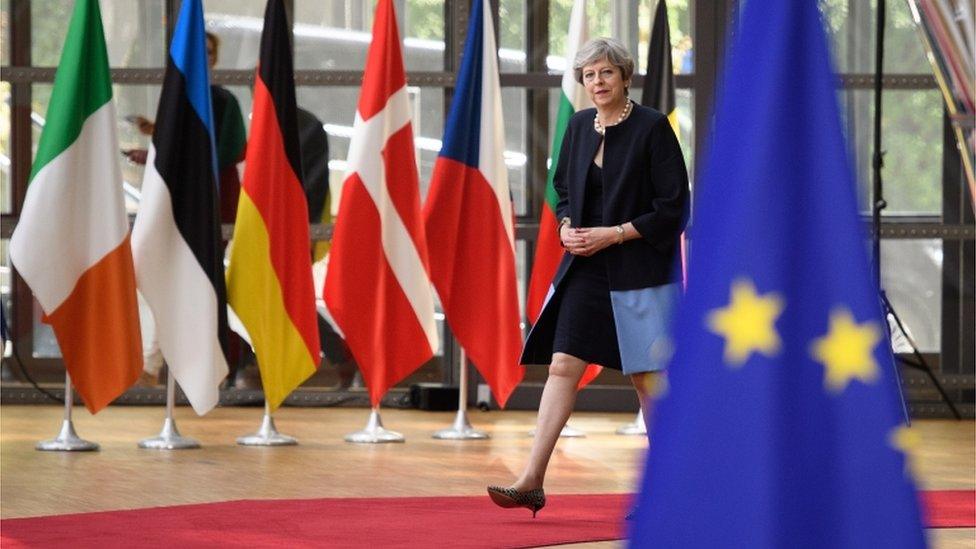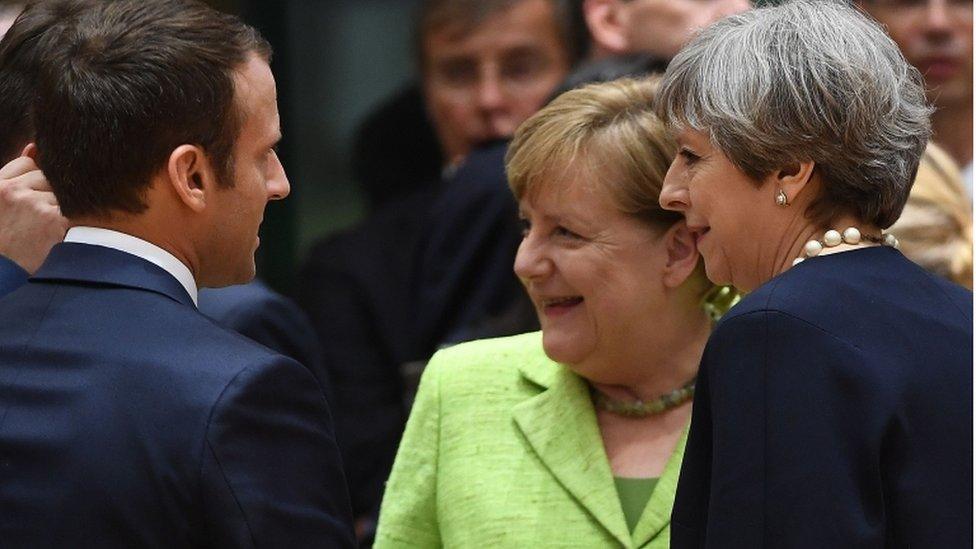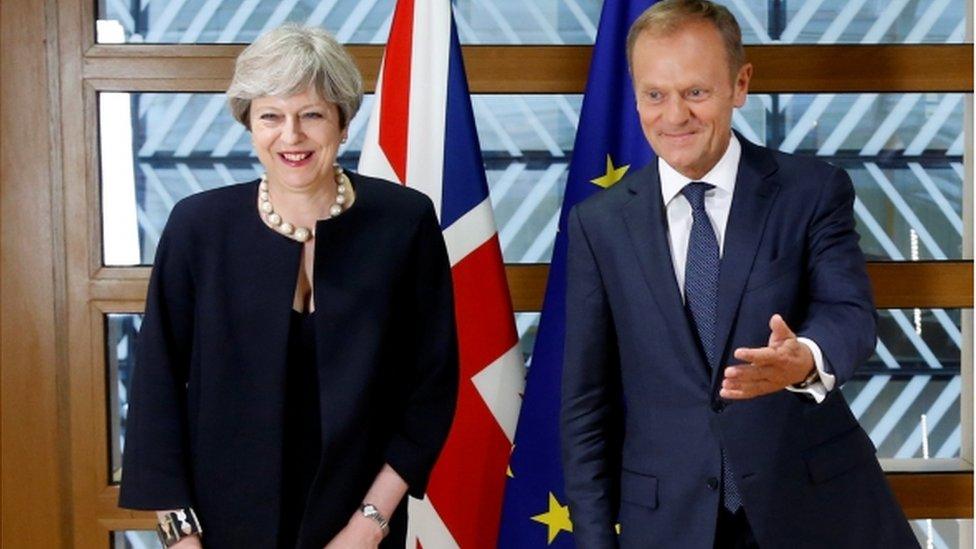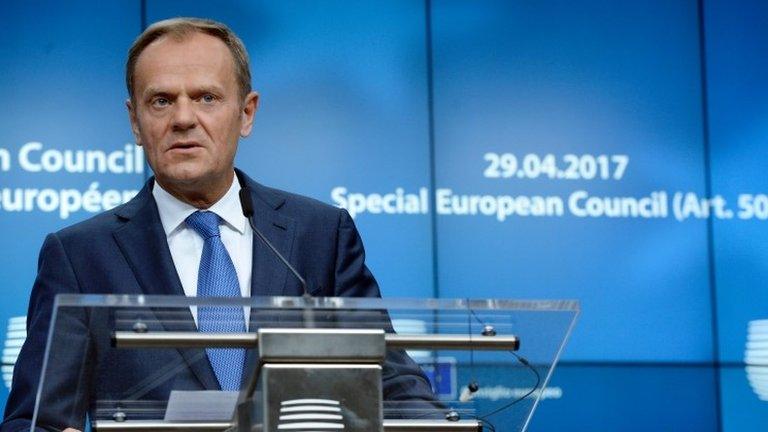Brexit: May unveils 'fair and serious' offer on EU citizens
- Published

About three million EU citizens living in the UK would be allowed to stay after Brexit, Theresa May has proposed.
A new "UK settled status" would grant EU migrants who had lived in the UK for five years rights to stay and access health, education and other benefits.
Proposals were unveiled at a Brussels summit but are dependent on EU states guaranteeing Britons the same rights.
German Chancellor Angela Merkel called the plan a "good start", but Labour said it was "too little, too late".
Many EU citizens in the UK, and Britons living abroad, are worried about their status once Brexit happens. The UK's exit deadline is 30 March 2019.
Addressing other EU leaders at her first summit since the general election, the prime minister said she did not want anyone to have to leave or families to split up.
"No one will face a cliff edge," she said.
"The UK's position represents a fair and serious offer, one aimed at giving as much certainty as possible to citizens who have settled in the UK, building careers and lives and contributing so much to our society.''
Mrs May said the UK wanted to protect the rights of EU citizens in the UK - and the rights of UK expats in other European countries.

Angela Merkel said she wanted the "widest possible guarantee" for EU citizens
But Downing Street has not yet specified what the cut-off date will be for new residents, after which the guarantee would no longer apply. It will be no earlier than March 2017, when the UK formally began leaving the EU by issuing the Article 50 notification, and no later than March 2019 when it will actually leave.
Those arriving up until the point of departure would have a "grace period" - expected to be two years - to build up the same "UK settled status", she told EU leaders.
Mrs May also said the system would be streamlined, doing away with an 85-page permanent residency application form which has attracted complaints.
BBC political editor Laura Kuenssberg said the PM was already on a collision course with her European counterparts over her plan for the rules of the new system to be applied by a British court - Brussels has insisted it must be the European Court of Justice that oversees it.
But she added that the offer was intended to be a symbol that the UK was getting on with Brexit at a time of turmoil at home, in the wake of the general election result which led to Mrs May losing her Commons majority.
Our correspondent said the full details would not be unveiled until next Monday, and it was not yet clear if the offer was as generous as that put forward by the EU a month ago. Details on issues such as the rights of EU citizens' relatives abroad and their descendants, were not yet known.
'Uncertainty for a year'
Labour's Keir Starmer, the shadow Brexit secretary, said: "Labour has been clear that people should not be bargaining chips in the Brexit negotiations.
"The prime minister's offer is too little too late and falls far short of the full and unilateral guarantee Labour would make."
Giving a "clear commitment" that there would be no change in the status of EU nationals in the UK would help deliver the same deal for UK nationals living in the EU, he added.
Liberal Democrat leader Tim Farron said the plans left too many unanswered questions.
"Theresa May could have given a guarantee from day one, instead she has allowed our friends, colleagues and neighbours to live in uncertainty for a year," he said.
"Even now, Theresa May continues to insist on using EU nationals in Britain as bargaining chips and has failed to provide a full and clear right to stay for all."
German Chancellor Angela Merkel told reporters she wanted "the widest possible security guarantees for EU citizens" from the Brexit deal and called the offer "a good start".
She added: "But there are still many many other questions linked to the exit, including on finances and the relationship with Ireland. So we have a lot to do until [the next EU summit in] October."
Both the UK and the rest of the EU say they want to come to an arrangement to secure the status of the 3.2 million EU citizens in the UK and the estimated 1.2 million Britons living in EU countries.
The European Union has said they should continue enjoying the same rights, enforceable by the European Court of Justice.
UK opposition parties had urged the government to make a unilateral guarantee to the EU migrants - but ministers have insisted a reciprocal deal is needed to ensure British expats are protected.
The gathering of 28 EU member states' leaders came the day after measures to enable Brexit dominated the Queen's Speech. Mrs May's Conservatives are still trying to secure the Commons support needed to pass their programme.
Mrs May was not present when the leaders of the remaining 27 EU states held a brief discussion about Brexit after her presentation.
- Published22 June 2017

- Published29 April 2017
